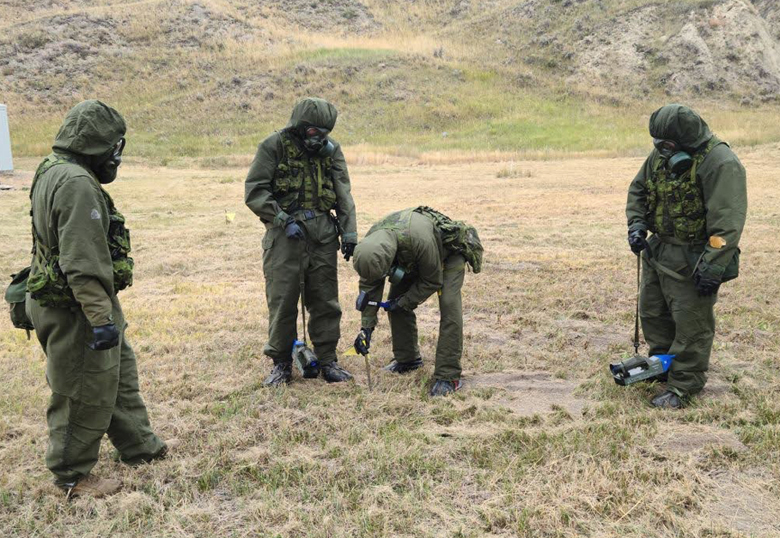Being a master of science student in Dr. Trushar Patel’s (Chemistry & Biochemistry) lab at the University of Lethbridge put Sergeant Michael D’Souza in the perfect position to create a new collaboration between the University and the Canadian Armed Forces.
D’Souza is a member of the Primary Reserves and part of South Alberta Light Horse (SALH), an armoured reconnaissance regiment tasked with the detection, identification and management of biochemical and nuclear weapon threats in conjunction with regular forces.

At a recent training exercise at the Kipp Rifle Range, several U of L researchers and officials were invited to watch the troops as they surveyed potential areas of exposure to hazards like nerve and blister chemical agents, biological pathogens and nuclear contamination. The purpose of the training was to qualify soldiers on chemical, biological, radiological and nuclear defense. Part of the exercise involved a test where soldiers worked with CS gas, a major component of tear gas.
“This training was designed to demonstrate the types of missions and challenges soldiers face in the field and how academic institutions can partner with Canadian Armed Forces units to target defense research to improve the conditions of operations and detection of hazards,” says D’Souza.
Discussions during the training exercise focused on creating research opportunities and support systems for students considering joining the Canadian Armed Forces or those who are already part of the reserves.
“Connecting with the SALH helps us understand the needs and requirements of the armed forces and that enables us to better serve them through education and training,” says Patel. “The U of L can link soldiers’ theoretical understanding of biological, chemical and nuclear threats to their tasks in hazardous environments.”
“This is an excellent opportunity for the U of L to develop research and training partnerships that will impact the armed forces through capacity development and training related to emerging biodefense threats,” added Dr. Hans-Joachim Wieden, a professor in the Department of Chemistry & Biochemistry. “In addition to enabling collaborative research projects and sharing of expertise, training partnerships like this are key to unlocking unique career paths, work-integrated learning opportunities and job placements.”
D’Souza, who joined the Canadian Armed Forces in 2010 when he started his undergraduate studies at the University of Calgary, participated in the Paid Education Program, which financed his education. He also gained valuable experience.
“The Canadian Armed Forces Primary Reserves is an exceptional career opportunity for students interested in connecting their education to either the civil service or the armed forces, while learning new skills,” says D’Souza. “With continuous employment and numerous funding opportunities, being part of the armed forces can take students places, even if they stay in for just their undergraduate program or many years after.”
Collaborations like that between the U of L and South Alberta Light Horse ultimately benefit students and give them skills that will serve them throughout their working lives.
“Experiential learning opportunities like these are essential for students, who benefit personally, professionally and academically, in the future,” says Kathleen Massey, associate vice-president (students). “The University’s new Career Bridge: Centre for Work Integrated Learning and Career Development is the ideal place to help students make these important connections.”
